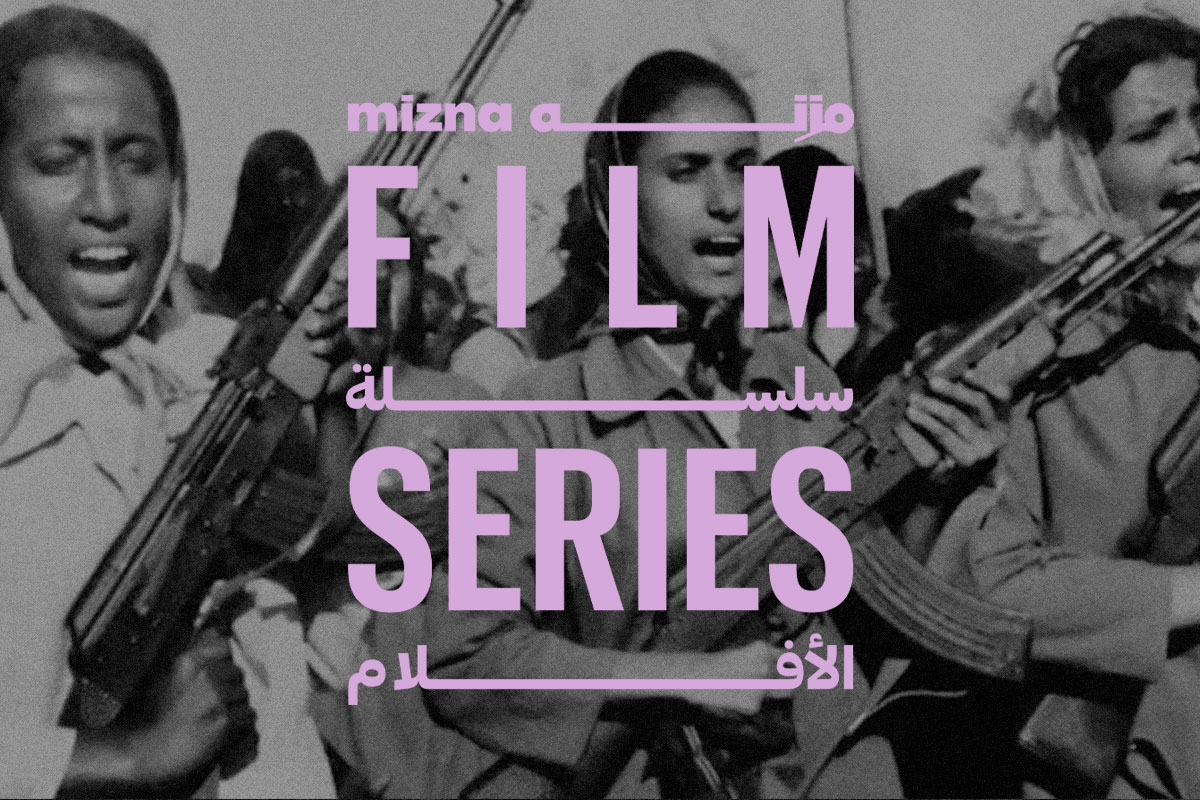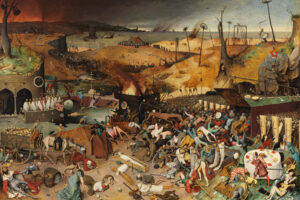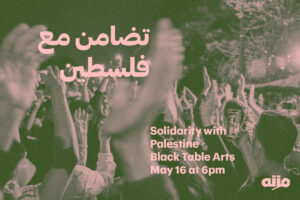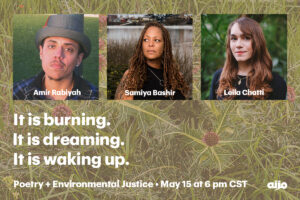
January 15, 2024
Mizna Film Series 2024: Feminist Visions–SWANA Cinema by and about Women
In 2024, the quarterly Mizna Film Series (MFS) returns to the Trylon Cinema with a program entitled Feminist Visions. Since the beginning of cinema’s history, women have always worked both in front of and behind the camera. For this series, we focus on Arab/SWANA women who participated in creating and capturing images from the 1970s, ’80s, and ’90s––who made documentaries about uprisings and revolutionary tactics as well as women who presented stories that challenge notions of gender and sexuality in narrative form. This year’s lineup includes new restorations and archival prints of Arab/SWANA cinema, focusing specifically on films by and about women. The films in Feminist Visions offer a range of thematic considerations, from documenting women’s role in collective resistance to depicting a women’s perspective on class and violence. Including documentaries and narrative features, the program will showcase films that were presented in large festivals, like Cannes, as well as films that were made for television broadcasts. Beginning with Heiny Srour’s stunning depiction of a women-led uprising in Oman, this year’s lineup draws from the diverse history of women filmmakers, from countries and regions across Southwest Asia and North Africa.
Learn more about the Mizna Film Series here.
Tickets + Passes
In-person Trylon tickets: $10
Virtual Tickets: Pay what you can, $5 suggested donation
UPCOMING

AUG 28: ZERDA AND THE SONGS OF FORGETTING + MONANGAMBEE

ZERDA AND THE SONGS OF FORGETTING (LA ZERDA ET LES CHANTS DE L’OUBLIL)
(1982, DCP, 59m, Arabic and French with English subtitles) dir Assia Djebar
Algerian novelist and translator Assia Djebar changed professions to make LA ZERDA ET LES CHANTS DE L’OUBLI. Using French newsreels, the film represents the colonization of the Maghreb, rethinking the dominant narrative of this history. A furious swan song to colonial violence, the film plays with documentary form, recutting images and reconstructing history alongside a soundtrack comprised of multi-vocal chants and experimental music. ZERDA employs montage in a search for truth––a truth that the colonial “killing gaze” pointedly omits or does not show. In Djebar’s cut, there is “resistance behind the mask.”

MONANGAMBEE
(1969, DCP, 17m, Portuguese and French with English subtitles) dir. Sarah Maldoror
“Monangambee!” Spread from hut to hut, from village to village, this cry made even the bravest men in Angola shiver. “Monangambee” translates to “white death,” and in the past, this cry accompanied the arrival of Portuguese slave traders. (Nadia Kasji) Shot in and co-produced by newly independent Algeria, Maldoror’s film links the anti-colonial struggle of the 1950s, ’60s, and ’70s to the history of African enslavement, deconstructing and rethinking the legacy of colonial violence.
Watch in-person only on August 28, 2024 at 7pm at Trylon Cinema

MAY 22: ATTEYAT EL-ABNOUDY RETROSPECTIVE
The May program of Mizna Film Series: Feminist Visions presents a retrospective of Atteyat El-Abnoudy’s work. Often considered Egypt’s pioneer documentary filmmaker and “filmmaker of the poor,” El-Abnoudy’s oeuvre maps the intersections of class, labor, and gender in Egypt, largely through the perspectives of women. With training in law, journalism, and filmmaking, El-Abnoudy was active as a documentary filmmaker from the 1970s through the early 2000s. El-Abnoudy’s films offer an intimate glimpse into the lives of working-class Egyptians through politically engaged and socially preoccupied documentary form. Giving a voice to women outside of Egypt’s metropolitan centers, El-Abnoudy enables her film subjects to return the camera’s gaze and narrate their stories in their own words.
In 2011, El-Abnoudy donated her archival collection to the founders of Cimatheque, an alternative film center in the heart of Cairo, as they were setting up their space. The donation kick-started and shaped the center’s archival practice. Cimatheque is now a multi-purpose cultural space that provides resources, trainings, and programming for the independent filmmaking community in Cairo. Additionally, Cimatheque houses an archive comprised of rare films, prints, manuscripts, and other extracinematic materials spanning more than 60 years of Egyptian, Arab, and global alternative cinema history. Since it opened its doors in 2012, Cimatheque has strived to make Egypt’s cinematic heritage and El-Abnoudy’s film collection accessible. Part of that task includes safeguarding El-Abnoudy’s film collection, and Cimatheque is set to undertake a restoration project of select titles from the collection in order to digitize and preserve her work.
This program is co-presented with Cimatheque and ArteEast.

HORSE OF MUD (1971)
Atteyat El-Abnoudy’s first documentary depicts women in a mud-brick factory in the centre of Cairo, where they are treated like ‘horses’, working at repetitive and monotonous tasks in miserable conditions. Nevertheless, El-Abnoudy brings out the women’s dignity, showing a beautiful choreography to their movement. By giving control of the microphone to the workers themselves, she also allows the women’s own stories to be interleaved with their work

SAD SONG OF TOUHA (1972)
In many ways the sister film to Horse of Mud, El-Abnoudy’s second film, Sad Song of Touha, was her graduation film at the Film School in Cairo. This documentary is a portrait of Cairo’s street performers. The artistry of this community of fire-eaters, child contortionists, and other performers is captured through the lens of El-Abnoudy’s unobtrusive camera, accompanied by the spare and haunting narration provided by poet Abdel Rahman El-Abnoudy.

THE SANDWICH (1975)
The Sandwich is an experimental short that explores the idyllic rural province of “Abnoud.” In a village that seems to have escaped the passage of time, the softness of the film’s focus on a group of children freely playing in an open, green space is effectively altered by outside forces. Deftly combining elements of fiction and non-fiction, The Sandwich is perhaps the lesser-known yet more confident of El-Abnoudy’s early films.

RAWYA (1995)
A portrait of an ambitious peasant female artist in Upper Egypt.

PERMISSIBLE DREAMS (1982)
Told through the eyes of Oum Said, a woman farmer living near the canal zone, Permissible Dreams captures a woman’s struggles with societal and gender inequality and the desire for a real education, but in typical El-Abnoudy fashion, eschews ideological trappings or the fetishizing of Egypt’s poorer classes.
Watch IN-PERSON ONLY May 22, 2024 at 7pm at Trylon Cinema
PAST

FEBRUARY 28: NEW RESTORATIONS BY LEBANESE WOMEN FILMMAKERS

THE HOUR OF LIBERATION HAS ARRIVED BY HEINY SROUR (1974)
The Hour of Liberation Has Arrived archives a mostly forgotten moment in Arab/SWANA history, when a feminist, guerrilla movement in Dhofar rose up against the Sultanate of Oman. Srour and her film crew entered the war zone, vulnerable to British air bombardment, to capture footage of the People’s Liberation Army, who fought without rank or pay, implementing social reforms and projects like schools, roads, hospitals, and farms. The film documents the possibility of collective uprisings against British and US-backed colonial projects. The Hour of Liberation Has Arrived screened at Cannes and remains an important film in the archive of SWANA and feminist resistance.

PALESTINIAN WOMEN BY JOCELYNE SAAB (1974)
In a short film, originally commissioned by French television but never aired, Jocelyn Saab follows Palestinian women in Beirut at the peak of the Palestinian revolutionary movement. Saab interviews women in refugee camps, during their fida’ee training, and at university, offering an intimate look into the Palestinian resistance as a feminist, refugee, and class struggle.
Watch IN-PERSON ONLY February 28, 2024 at 7pm at Trylon Cinema












